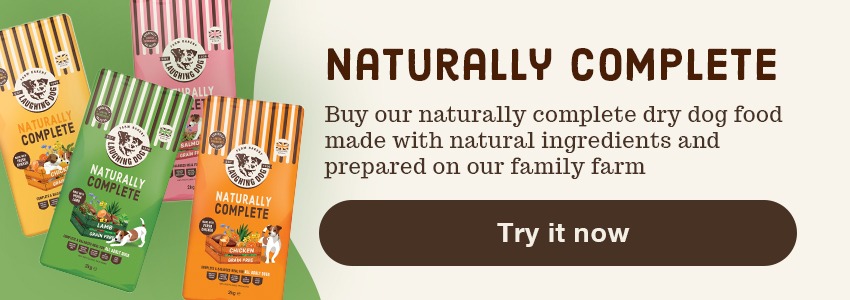Getting the right dog food is essential for a happy and healthy life. Throughout different stages of their life, your four-legged friend has various nutritional requirements, from those early weaning stages, the best dog food can help determine the length of your dog’s life.
The right dog food provides your dog with energy for those long walks, and nutrients to keep every tissue, muscle and cellular process going strong. There isn’t a straightforward answer for “what dog food should I feed my dog?”, but here at Laughing Dog we firmly believe that understanding the ingredients that go into the food can steer you in the right direction.
That’s why we have put together our dedicated list: what ingredients should you feed your dog?
‘Free from’ dog diets
Firstly, it is important to understand that every dog, much like every human is different and simply because one dog food ingredient works well for one animal, does not mean it will for the next. Some dogs, due to adverse reactions or intolerances, are best suited to grain free or wheat free diets.
These ‘free from’ dog diets require owners to be aware of what exactly goes into your dog’s food to ensure they are not digesting anything which will upset their tummies, but just as importantly, ensure they are still getting the right level of nutrients for development.
Think about your own diet…
From a young age, we are educated, as humans, to consume a varied diet of fruit, vegetables, carbohydrates, fibres, dairy, proteins and fats. We also have a rough idea of the levels of these we should be consuming, for example, five portions of fruit or vegetables a day. But just like dogs, us humans can have intolerances or allergies to particular foods or certain food groups and have to replace those nutrients with others.
This methodology works in a very similar way for our dogs. While there is less of a written rule book advising on the number of servings of specific food groups, here at Laughing Dog have broken down our list of ‘what ingredients should you feed your dog’, into manageable bites!
What are the different types of dog food?
There are so many different types of dog food on the market, and it can be difficult to know what to feed your dog – but that’s a whole other topic! Whether you choose a dry, wet, raw or fresh diet, there are still key dog food ingredients that you should be looking out for.
When a pre-made dog food diet (a dog food that you can purchase e.g. wet dog food or dry dog food) is described as ‘complete’ this means it is balanced and complete; in other words, it contains the right mix of all the nutrients that your dog needs and you do not need to add anything else to your dog’s diet.
There are lots of different nutrients but each of them belongs to one of the following six groups: proteins, fats & oils, minerals, vitamins, carbohydrates, water. There are 37 nutrients required by dogs and complete dog food contains all of these nutrients that your dog needs every day.
(Please note, if you are feeding your dog a raw diet or making their food from scratch, you will need to ensure that it is complete and balanced. We’d recommend seeking advice from a vet to ensure your dog is getting all the nutrients that it needs.)
What ingredients should you feed your dog?
Protein
Whether in dry, wet, raw or fresh form, most dogs get protein from meat in their diet. Of course, some pet parents choose to feed their dog a vegetarian diet but to ensure your dog is being fed a complete and safe diet, we would recommend that you seek guidance from a vet or pet nutritionist if you are choosing to do this.
Different meats have different benefits, but they are all packed with nutrients which benefit your dog. Here are some examples of the ingredients we use here at Laughing Dog in our complete dog food recipes:
- Fresh chicken
Irresistibly succulent chicken is high in protein and gentle on digestion. - Grass fed lamb
Gentle on digestion and rich in protein, vitamins, phosphorus and selenium for healthy muscles and immunity. - Beef
Tasty beef is high in protein to help maintain healthy muscles. - Duck
Irresistibly succulent duck that is high in protein and gentle on digestion. - Salmon
A rich source of protein and omega 3.
Carbohydrates
Dogs are omnivores like us humans. This means they can eat lots of different types of food and they like both meat and vegetables. However, some pet parents prefer to just feed their dog on a meat diet (for example, raw feeding), and as such we would always advise that guidance is sought from a vet or pet food nutritionist (The Pet Food Manufacturers’ Association, or PFMA for short, has some great guidance on feeding raw dog food).
It is a common misconception to think that wheat free and grain free ranges cut out white potatoes and are therefore carbohydrate-free. Wheat free dog foods will often use carbohydrate sources like barley, rice and oats, while grain free dog foods will use grain free sources like white potato or sweet potato.
- Sweet Potato
Easily digestible and a good source of B vitamins. - Potato
Rich in antioxidants and a good source of soluble fibre.
Grains
Unless you opt for a grain free dog food diet, grains can be beneficial for energy and to aid digestion.
- Barley
A natural source of slow release energy and rich in dietary fibre to help aid digestion. - Oats
A natural energy booster and helps keep cholesterol levels healthy. - Rice
Protein-rich, easily digestible and a great source of energy. Brown rice provides essential minerals and B vitamins for a healthy nervous system.
Vegetables & fruits (and herbs)
Just like humans, dogs can eat vegetables and fruits in their diet. They can appear in many forms in dog food and are found in dry, wet and fresh dog food diets. When checking your ingredients list, you might like to look out for these, they all contain wonderful nutrients which are beneficial for your dog:
- Carrot
A good source of vitamin A. - Yucca (prebiotic)
A prebiotic that helps with stool odour. - Seaweed
A superfood source of mighty minerals including iodine to help maintain and support metabolism. - Parsley
Helps keep breath fresh and acts as a digestive aid to settle tummies. - Alfalfa
Rich in beta carotene, helping to keep skin, bones and eyes healthy. A natural antioxidant. - Cranberry
Rich in vitamins and natural antioxidants to help maintain your dog’s immunity and aid urinary tract health
Fats & Oils
Fats and oils are good for your dog’s diet and help to make it a complete and balanced diet. Here are some of the fats and oils that we use in our dog foods to ensure it is complete and balanced:
- Linseed
Rich in Omega 3 and 6 to help maintain healthy skin, glossy coats and good immunity. - Poultry Oil
- An essential fatty acid to help maintain overall health (and used in our chicken recipes to ensure our recipe is single species).
- Rapeseed Oil
An essential fatty acid to help maintain overall health.
Vitamins & Minerals
Just like in our human diets, in order to make a dog food complete and balanced essential vitamins and minerals are required. For many processed dog foods, these can be contained both within the ingredients and also can be added as a supplement too.
Water
Always ensure that your dog has access to clean and fresh water when eating. Water is part of their balanced diet.
At Laughing Dog we feel it is essential to provide you with the in-depth information of what all our dog food and dog treat products contain. Therefore we list them in detail on both our website and our packaging. We carefully select our ingredients to give your four-legged friend the more beneficial ingredients for long and happy life.
So in short, if you are wondering what ingredients should you feed your dog, then use our help sheet for all the information.



